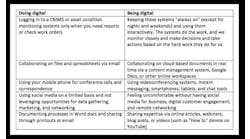Breaking barriers: Shattering the glass ceiling as a woman in manufacturing
In today’s society, women have made incredible strides across various industries, breaking barriers that once only allowed them to take on limited roles within the workforce. However, despite the many advances that women have made, a stubborn and invisible obstacle known as the glass ceiling continues to derail the progress of women in male-dominated workplaces.
The glass ceiling
This an invisible yet ever-present barrier keeps women from obtaining higher-level positions within organizations. Despite having the same qualifications and capabilities as their male counterparts, women often find themselves hitting this barrier, impacting their professional growth negatively by limiting their access to leadership roles. One of the main culprits behind the glass ceiling is the prominent exclusionism in male-dominated industries.
Historically, certain fields have been dominated by men, and this traditional bias is still present in many workplaces today. Preconceived notions about gender roles often lead to unfair treatment and opportunities for women within these industries, making it a challenge to break through that barrier. Another contributing factor is the noticeable wage gap between men and women. Unequal pay not only undermines a woman’s financial opportunities but also sends a discouraging message about her worth and contributions in the workplace.
The wage discrepancy often persists even when qualifications and experiences between a man and a woman are comparable, further perpetuating the glass ceiling effect. Likewise, the lack of female senior-level role models can discourage aspiring women from pursuing leadership positions, or even from entering certain industries. Without examples of successful women at the top, it becomes harder for others to see themselves in those roles, further reinforcing the idea that reaching senior positions is not feasible.
The enemy within
Imposter syndrome further exacerbates the problem, leaving women struggling with their inner doubts about their abilities and qualifications. These long-standing stereotypes in society have made many women feel inherently inferior to their male counterparts, resulting in their constantly seeking validation and feeling the need to prove their competence in the workplace.
As a result, women may downplay their achievements, hesitate to take credit for their successes and attribute accomplishments to external factors instead of recognizing their own skills and hard work. This self-doubt and fear of being exposed as a fraud can lead to missed opportunities for career advancement and professional growth.
My journey
As a woman in the manufacturing industry, I have faced my fair share of challenges. In a traditionally male-dominated sector, I’ve had to repeatedly combat gender bias and prove my competence.
Throughout my career, I’ve realized the importance of mentorship and support networks and seeking opportunities to go above and beyond in my current role. Having mentors, both male and female, and expanding my skill set in preparation for the next challenge have helped me gain valuable insights, navigate corporate politics with ease and build confidence in my abilities.
That’s why I’m such a strong advocate for encouraging workplaces to establish formal mentorship programs, which provide women with the guidance and support they need to thrive in their careers. In sharing my story and insights, I hope to emphasize the significance of skill-building and continuous learning. Thankfully, I work for a company that promotes honing my expertise and staying up to date on industry trends, so I can better showcase my competence and skill set, challenging the doubts often cast on my capabilities.
Breaking barriers, combating imposter syndrome
To break through the glass ceiling and combat imposter syndrome, organizations need to:
- Create an Inclusive Workplace: Promoting diversity in leadership roles can dismantle the glass ceiling, while inclusive policies and practices can address the wage gap.
- Encourage Mentorship: Establishing mentorship programs and sponsorship initiatives within organizations can offer women guidance, support and advocacy to advance their careers.
- Promote Professional Development: Encouraging women to invest in their skills development and offering training and development opportunities internally can boost their confidence, help them combat imposter syndrome and contribute to their individual growth.
- Raise Awareness, Challenge Stereotypes: Promoting awareness about imposter syndrome and challenging gender stereotypes can create a more supportive and understanding work environment.
Combined, the glass ceiling and imposter syndrome continue to hinder women’s progress in the workplace, limiting their access to leadership roles and further perpetuating gender disparities. My journey and insights into the manufacturing industry serve as an inspiration, demonstrating that, with determination, support and skill-building, women can overcome these barriers and thrive in their careers. By fostering inclusive workplaces, promoting mentorship and challenging stereotypes, we can break through the glass ceiling and create a more equitable and empowering future for women in the workplace.




